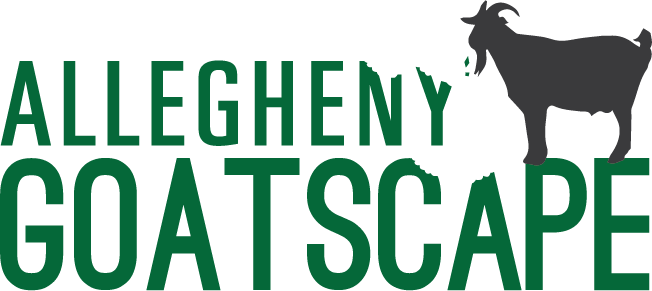Allegheny GoatScape improves community ecology by clearing overgrown land with a friendly herd of goats.
1. Natural areas or vacant lots overgrown with invasive plants are identified. Allegheny GoatScape surveys the area for feasibility. We provide expectations, an estimated cost and anticipated timeline.
2. Prior to a herd’s arrival, Allegheny GoatScape clears a fence line and sets up the fencing and a shelter for the animals. The herd arrives at the site and immediately gets to work eating the vegetation. The humans of Allegheny GoatScape ensure the goats have what they need each day.
3. Once the goats eat through the vegetation on site, they are transported to their next location. The addressed land is now better prepared for additional restoration or ongoing maintenance because the overgrown plants have been eaten away.
-
AGS prioritizes work with stakeholders on public property in Allegheny County, including the Pittsburgh city parks, with community organizations, college and universities, and other community-based non-profits. AGS’ project sites are on an array of topographies, and generally, are overgrown wooded lots with sloped topography and over-present with plants like knotweed, autumn olive, honeysuckle, wild rose, porcelain berry, among others.
You may fill out our Potential Project Intake Form so that we have your information (this is required of all projects), but this does not guarantee that we will work on your project.
-
Allegheny Goatscape serves communities and organizational partners to clear natural areas or vacant lots overgrown with invasive and unwanted plants. Areas are reviewed by AGS staff for feasibility.
AGS projects are partially funded through fee-for-services and partially funded with individual and philanthropic support. When working at a site, and before bringing in the goats, Allegheny Goatscape team members clear a fence line, set up portable electric fencing, solar battery, shelter and water. Once the herd arrives on site, they get to work eating the given vegetation. Once the animals have completed eating through a site, the goat herds are transported to their next scheduled location. Allegheny GoatScape is not responsible for the next steps, but as the plants have been defoliation and cut, site restoration or usage is now more manageable and AGS can provide suggestions for next steps.
Something to consider: Goats are not the right choice for all potential project sites. Based on availability, management goals, preferences, and site conditions, the goats may or may not be a good fit. We cannot consider any private projects outside of Allegheny County, and our opportunities for private projects is minimal at this time. Sorry for the inconvenience!
-
Goats are effective, ecologically-friendly and create social engagement as they work. The herd manages Pittsburgh's steep slopes with ease, and collectively removes thorny, itchy, and invasive plants. They remove vegetation in ways that people and machinery cannot. The goats reduce the need for fuels and herbicides, while adding ready fertilizer to the soils at project sites which are often eroding or undernourished. Goats’ preference for vines and shrubs means that in some instances they climb and stamp down forage. Goats are agile, adaptable to diverse forage, and rather immune to parasites or viruses when managed properly. Goats' four stomach digestion systems reduce rates of seed viability, and make it possible for goats to eat so much green and brown plant material. Goats, among other ruminants, like cows and sheep, defoliate plants of their ability to photosynthesize, and overtime may reduce over abundant and invasive vegetation.
-
You can expect one of our herds to eat through one full acre in 12-14 days. This can vary with vegetation type and density, weather, and topography.

